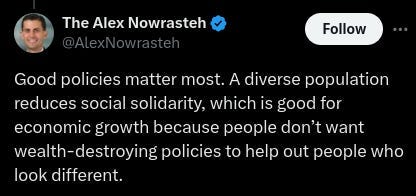Schizo Orcs Peddle IQ Science While Someone Punches a Free Market Guy
Short Notes VI
A selection of musings from my Notes Stream on Substack.
See my previous Short Notes I, Short Notes II, Short Notes III, Short Notes IV and Short Notes V for more.
I never thought about it that way, but one disturbing aspect of AI really is its “blowing up of time”, its eerie speed. Perhaps because that alone proves there is no contemplation there whatsoever, no embodiment, no unfolding and ripening of ideas. Schizotemporality indeed.
But to take this insight and infer we need to make more time for contemplation, as in allotting time slots and the like, would be just another instantiation of schizotemporality. Contemplation can only happen spontaneously, playfully, in the context of a life well lived, of a healthy mind attuned to embodied reality.
(In answer to the essay Schizotemporality and contemplation)
So, about those “misunderstood, sensitive orcs”…
People need to understand that LOTR is not a historical novel, or an alternative history, or sociology.
LOTR takes place in the mythological realm, a sort of alternative dimension where the same fundamental energies and dynamics of the Cosmos manifest and play out differently. Here, they are more directly “fleshified”, whereas in our realm, they are more subtle, more hidden, and need to be discerned by the soul as opposed to perceived directly.
Where in our world, magic for the most part manifests as narratives, words, and deep understanding followed up by consistent action, in LOTR it is applied directly and instantly. Where in our world, nobility and courage cannot be recognized at first sight, in LOTR it is represented outwardly in the races. And where in our world, evil must be discerned via intelligent observation and learning to resist deception, in LOTR it can confront you in the form of Orc armies.
(Hence the bible talks about “eyes to see and ears to hear”, Paul talks about “walking according to the spirit”, and Heraclitus sayz: “The Logos: though men associate with it most closely, yet they are separated from it, and those things which they encounter daily seem to them strange.” In our world, we have to go beyond perception, towards discernment of higher realms and their basic principles.)
In other words, it is utterly absurd to depict Orcs as conflicted beings deserving sympathy, because in Middle Earth, they are a direct representation of evil.
But of course, the realm of myth and our own realm are connected: changing the dynamics there has an impact on our perception here.
While it is true that in our realm evil is often more subtle and cannot be directly perceived, it exists just as much as in Middle Earth. If we lose the ability to represent and recognize it symbolically, in a fictious story that presents basic building blocks of the Cosmos directly, then our ability to recognize it in our realm is weakened as well (and vice-versa). So, to give an example, a psychopath in our realm comes close to representing pure evil, sort of a human-looking orc. It is not easy to spot them, to look beyond the mask, to discern his (or her!) lying, manipulation and soulless cruelty. But if we pretend that Orcs (pure evil), this fundamental cosmic force, doesn’t even exist, because it’s all relative and it all has feelings and whatever, then we are completely helpless when facing it.
And so, while a lot of this entertainment garbage might be driven by utter ignorance of such matters, cringe-ly confusing mythology and sociology, there is also a more sinister aspect to it: by warping the mythical realm, those who produce this stuff warp our “spiritual sight” too, and render us helpless in the face of evil in our own realm.
(See also my appearance on ’s podcast where we talk about this, among other things:)
Rejecting the material world is just a reaction to the purely material, and therefore means staying entirely in the materialist framework. Both views — not recognizing anything beyond the material and rejecting it in favor of the “spiritual” — are born of a mind wallowing in the material: the world of the “flesh”. Materialism and world-rejecting spiritualism are two sides of the same fleshly coin.
The right way of looking at it is to refuse having your outlook dictated exclusively by the strictly material. Which means accepting it for what it is, namely the world we live in, our reality directly perceived. Hence the material world is of the utmost importance. But we must also recognize that there is something beyond it that cannot be directly perceived, yet “seen” via discernment, soul-vision, and the process of playfully striving towards a life well lived and the feedback reality gives while we so strive.
The material world is embedded in this other, wider realm, which means that a proper understanding depends on embracing and studying the material world while doing our best to be informed by the world beyond it, the unseen world. We do that in part by gradually learning how the two worlds relate to each other: by staying aware of how one’s life unfolds in light of our ever-more refined understanding of the “good”. When we do something, wider reality answers, sometimes subtly, sometimes by force.
The “spiritualists” are right in that ultimately, it’s the non-physical world that counts, but we need to work with the material world and know it inside-out while staying connected to the non-physical. If anything, such an outlook leads to more interest in the reality directly perceived, and rejects only those aspects of it that limit us and keep us down, such as overly fearing material consequences instead of non-material consequences playing out in the wider realm.
The problem with IQ spergs is that they fail to recognize a most crucial ingredient to achieve anything: the vibe within a group of people, rooted in a “community of destiny” (Schicksalsgemeinschaft, as the Germans call it).
Adding up IQ points of individual academics doesn’t tell you much at all. It’s the community, the interactions, the off-hand jokes, the experience of life together by people who share a certain deep-culture background.
Now, I’m enough of a universalist to recognize that this isn’t purely about race or ethnicity, or even culture — especially in today’s globalized world. The concept of Schicksalsgemeinschaft (community of destiny) is helpful here: Going forward, groups who have been forged by intense experiences together might be the ones who achieve something great, whether academically, culturally, in business, whatever. The Covid experience certainly was such a Group Forge, perhaps creating the basis for a new Schicksalsgemeinschaft, sort of the dialectical synthesis of Globalism and Tribalism. (And no, that doesn’t mean ethnicity, culture and the rest are irrelevant.)
(See also my essay On Race.)
“Hold on, so Spenglerian cycles aren’t just material?”
“Consciousness, Joe, it’s about consciousness. Look, maybe the West will end, maybe not. But there’s going to be a huge shift in consciousness like you wouldn’t believe. It’s going to be the grandest thing we’ve ever seen.”
The woman might be crazy, but the moral of this story is not about crazy women at all. It’s about the iron cosmic law of Free Will, and what happens when you violate it.
(In response to this story on Notes. Please read it to understand the consequences of Free Will violations. It can be tricky, and a lot depends on the specifics, but we absolutely should not interfere in other people’s lessons and dynamics if we are not given permission to do so in one form or another, such as when we are sincerely asked for advice or feedback. Otherwise…)
When someone makes the argument that for almost all of human existence people everywhere have believed in an afterlife in one form or another, and that we therefore should perhaps humbly take it seriously, a common reply I just saw on X again is this:
“Well this just means that believing in an afterlife meant an evolutionary advantage, not that the belief is true.”
It never occurs to them that by the same token, not believing in an afterlife also just means an evolutionary advantage, and not that the idea of an afterlife is wrong.
If you want to make your case against what almost all people have believed across time and space, by all means do so, but leave those evopsych arguments out. Unless you are prepared to postulate that Darwinism magically stopped applying 150 or so years ago, which of course would render Darwinism false and destroy your very premise.
Why do people find history boring? And how to get out of that?
Part of the reason is that we are taught we need to start with reading textbooks. But everybody hates this sort of modern idea of “textbook history”, memorizing contextless dates, going through this pseudo-scientific pretense of giving the definite truth about our past when in reality, textbook-like history is just a mix between the current official myth and the lowest common denominator.
What you need to do is read intelligent historians making a case. That’s how you learn. And suddenly, history becomes utterly fascinating.
Every historian has a take, an angle; to pretend otherwise is delusional. That’s why the best historians are explicit about it: they tell you up front that they set out to argue a certain point, to give you a certain story.
Yes, there will inevitably be biases and blind spots, and you’ll get better spotting them and judging the quality of the historian’s mind. And you don’t have to agree with all of the conclusions and ideas. But that doesn’t make it any less valuable.
Studying history is about the most liberating thing you can do, because it means history loses its grip on you — a grip you weren’t even aware of. It allows you to be conscious about your past, how to look at it, and how it has shaped you.
This is not so much because you may realize you have been lied to about certain things (in a sense, that’s just a first step). It’s because you begin to understand. To truly grasp aspects of why a situation played out the way it did, why certain people acted the way they acted. It’s as if a cloud lifts from your mind, a warm feeling of light running through your veins, because you see through all the different versions of history, through the propaganda and earnest myths created by different peoples, through your own triggers and identifications. You see and feel the truth, in a sense, even though you cannot verbalize it fully, and even though there will always be a next step in understanding you don’t know about yet.
Don’t let anybody tell you that you need to read textbooks or “know history” before delving into specific and complex issues. Read good monographs and biographies instead, or even dabble in original research, and just use textbooks/online references to look up stuff to fill in the gaps if something piqued your curiosity. It’s well worth it.
Life’s good if you are a utilitarian.
Trying to read the Force:
The word “stuck” comes to mind. Something feels stuck.
Like there’s a drain, or a pathway, but it is stuffed full of shrillness, of 2-dimensional randomness, of madmen jumping up and down, left and right. Like a big, funny rectangle blocking the way.
Of course, if something’s stuck, it can get unstuck too. Once the blockage gives way, high pressure ensues.
(Posted on September 12)
Every people, every nation, has their founding myth. This whole seething after the Tucker-Cooper interview about Churchill was fascinating in that regard. Question key aspects of a people's founding myth, and they go bonkers.
I do see the necessity, indeed inevitability, of a common story that binds people together. It's always there, even among those who "deconstruct" the original story.
But here's the thing: there will always be a minority of folks who simply want to know the truth, incomplete as it may be. Who really want to know. And those people don't have a problem dethroning national heroes and established narratives. Whether it's Churchill, America's founding fathers, or leftist heroes from the 1960s.
Even if it undermines our patriotism, our ideological upbringing, established thought patterns of our milieu etc. We can never be completely free of those, and abandoning all of them would be foolish, because we literally can't think without a deep-seated and established framework. But since we want to know, we'll press ahead, to the best of our abilities, founding myths be damned.
Clearly, it's not for everyone.
This is the sort of drivel that makes me want to punch some Free Market guy.
See, some of the socialist institutions in European countries work very well, and did so for a very long time, such as public healthcare in places like France and Germany. (That’s just a simple fact. Resist the urge to argue against it.)
Part of the reason is that those are relatively small, relatively homogenous countries that see themselves as a “people”. There is an unspoken social pact that basically makes people accept a certain amount of inevitable freeloaders in the system, and that they may end up paying more if they are healthier or wealthier or whatever than they would need to otherwise. They accept it because at the end of the day, it’s for the benefit of their nation, their people as a whole. Solidarity and all that.
The guy who wrote that tweet is correct in that importing “diversity” beyond a certain limit leads to the destruction of this unspoken pact, particularly if large parts of the “diversity” come here with the explicit purpose of freeloading, gaming the system, and sending money to their home countries.
Unlike him, however, I deplore this development. He is a great example of how ideology can lead to plain evil: he wants to see systems that work(ed), and that people want, destroyed by eroding their social trust and cohesion, simply because his religion is muh Free Markets Create Wealth.
Despicable.
If you want to help me keep the lights on, become a paid subscriber — you’ll have access to the paywalled posts in the archive, too. Thank you very much.










"See, some of the socialist institutions in European countries work very well, and did so for a very long time, such as public healthcare in places like France and Germany. (That’s just a simple fact. Resist the urge to argue against it.)"
Glad to find somebody else who will say so. I realise and respect that there's a long Anglo-American tradition of opposing state intrusion into one's private life, unjust taxation etc, but I switch off when modern rightists--usually North Americans--persistently and hysterically identify 'woke' with 'SOCIALISM!!!!' (or even 'COMMUNISM!!!!'). It's a dumb, parochial meme that should be put to rest.
The willful destruction of long-standing historical nations for the sake of ARE ECONOMY is one of the gravest yet least acknowledged varieties of evil in our rotting civilization.